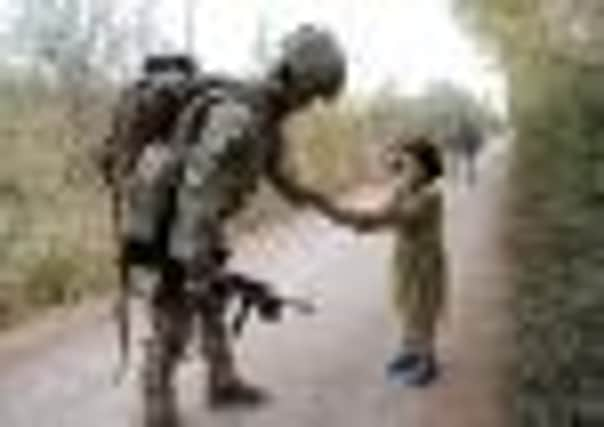William Hague: A key year to cement our long-term partnership with the Afghan people


Our objective in Afghanistan is shared by the Afghan government and all 50 nations that contribute forces to the International Security Assistance Force. We all want an Afghanistan that is able to maintain its own security and prevent the country from being used as a safe haven for international terrorists.
Our strategy is to help the Afghan government to build capable Afghan national security forces; to make progress towards a sustainable political settlement and to support the building of a viable Afghan state.
Advertisement
Hide AdAdvertisement
Hide AdCentral to that is the gradual handover of security responsibilities from international forces to the Afghan national security forces by the end of 2014. British and ISAF troops will continue to perform combat roles until then.
Our commitment in terms of aid, trade, investment and close diplomatic ties will of course last far beyond 2014.
No one should underestimate the scale of the challenges that remain, but we are confident that our strategy is the right one: 2012 will be an important year to consolidate progress.
The process of transition made considerable progress last year. This is the means by which responsibility for security across Afghanistan is progressively transferred from the international community to Afghan national security forces. Approximately half the Afghan population lives in areas now in the process of transition.
Advertisement
Hide AdAdvertisement
Hide AdThe progress made in Helmand by Afghan, UK and ISAF troops is illustrated by the inclusion of Nad Ali, alongside Lashkar Gah, early in the transition process, which began in July. The security situation in these districts is unrecognisable compared with the start of British operations in 2006.
Violence levels have fallen dramatically. Afghans have freedom of movement in Lashkar Gah and in all five central Helmand districts. Pupil enrolment for both girls and boys is rising, and the Afghan Government are able to provide services to the province.
British forces continue to conduct operations in Helmand, but are supporting a growing number of Afghan-led operations.
The success of such operations allows us gradually to focus our efforts on mentoring and training. We will help to create an Afghan national officer academy to produce the Afghan army officers of the future, and it will open its doors in 2013. It is expected to accept 1,350 recruits annually, and approximately 120 British troops will be based at the academy to provide training and related support.
Advertisement
Hide AdAdvertisement
Hide AdFor the first time since 2006, year-on-year violence levels decreased in 2011. This is a good indication of progress. However, the regional picture remains varied: in the east in particular the number of security incidents rose. We cannot be complacent, as gains are fragile and not yet irreversible, but we are firmly on track.
We have also seen progress on the political track. In December, I attended the international conference in Bonn which signalled that our commitment to Afghanistan will continue beyond the completion of security transition.
The Afghan government also made commitments at Bonn. They include further efforts to tackle corruption. They committed themselves to upholding international human rights obligations and to protecting women’s rights as enshrined in the Afghan constitution.
There have been a number of important developments in the political process already this year. Last month, the Taliban expressed their willingness to participate in a political office in Qatar. We welcome any steps towards reconciliation but recognise that they are at an early stage and that more work will be needed to move forward.
Advertisement
Hide AdAdvertisement
Hide AdNevertheless, the Taliban leadership have accepted the need to engage in a political process, and this is significant. If they are willing to renounce violence, break links with al-Qaida and respect the Afghan constitution, there can be a place for them in their country’s future.
A political office provides an opportunity for all Afghans to work together towards a sustainable peace, for it is only with the engagement of all Afghans that we can hope to see a durable settlement. Britain will continue to support the Afghan Government in these efforts.
None the less, Afghanistan remains one of the world’s poorest countries and its financial future is uncertain. A World Bank report published in November showed that the government budget shortfall might still be $7bn by 2021. At Bonn, we agreed in principle to provide long-term financial support.
These developments are essential to Afghanistan’s future. So, too, are the actions of Afghanistan’s neighbours. Pakistan has a crucial role and much to gain from improved stability in Afghanistan.
Advertisement
Hide AdAdvertisement
Hide AdIt already suffers more casualties from terrorism than any other country in the world. Both countries need to work together to stem the flow of militants, who undermine the sovereignty of both democratic governments and remain intent on killing their citizens and destabilising the region. The best way to achieve this is through regular, frank and honest dialogue.
Serious challenges remain. There will undoubtedly be setbacks and difficulties ahead, but we are making steady progress.
This will be an important year to consolidate this progress and to strengthen the international commitments to Afghanistan and long-term partnership with its people.
* William Hague is Foreign Secretary and MP for Richmond MP. This is an edited version of his latest update to Parliament on the Afghanistan conflict.